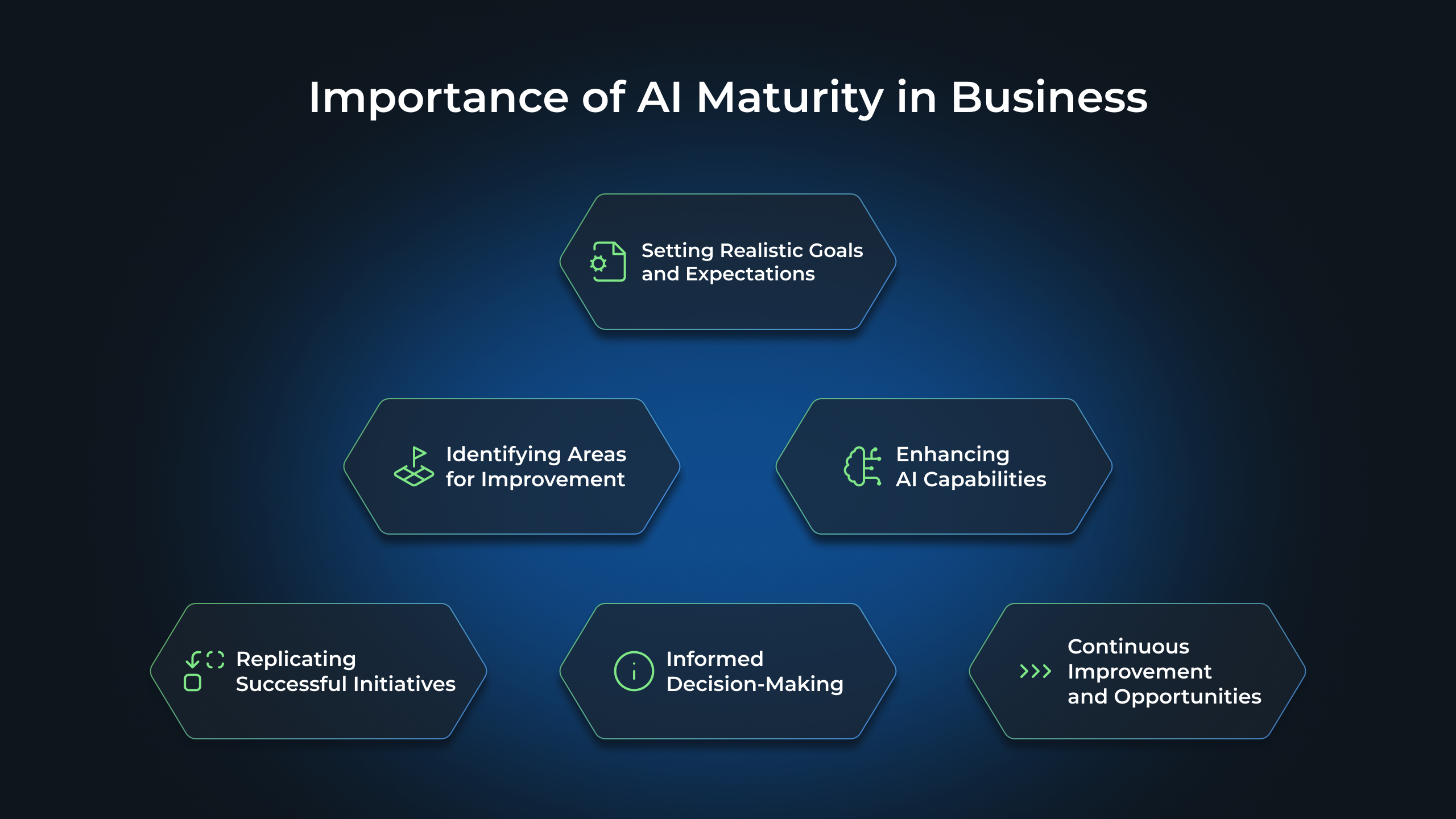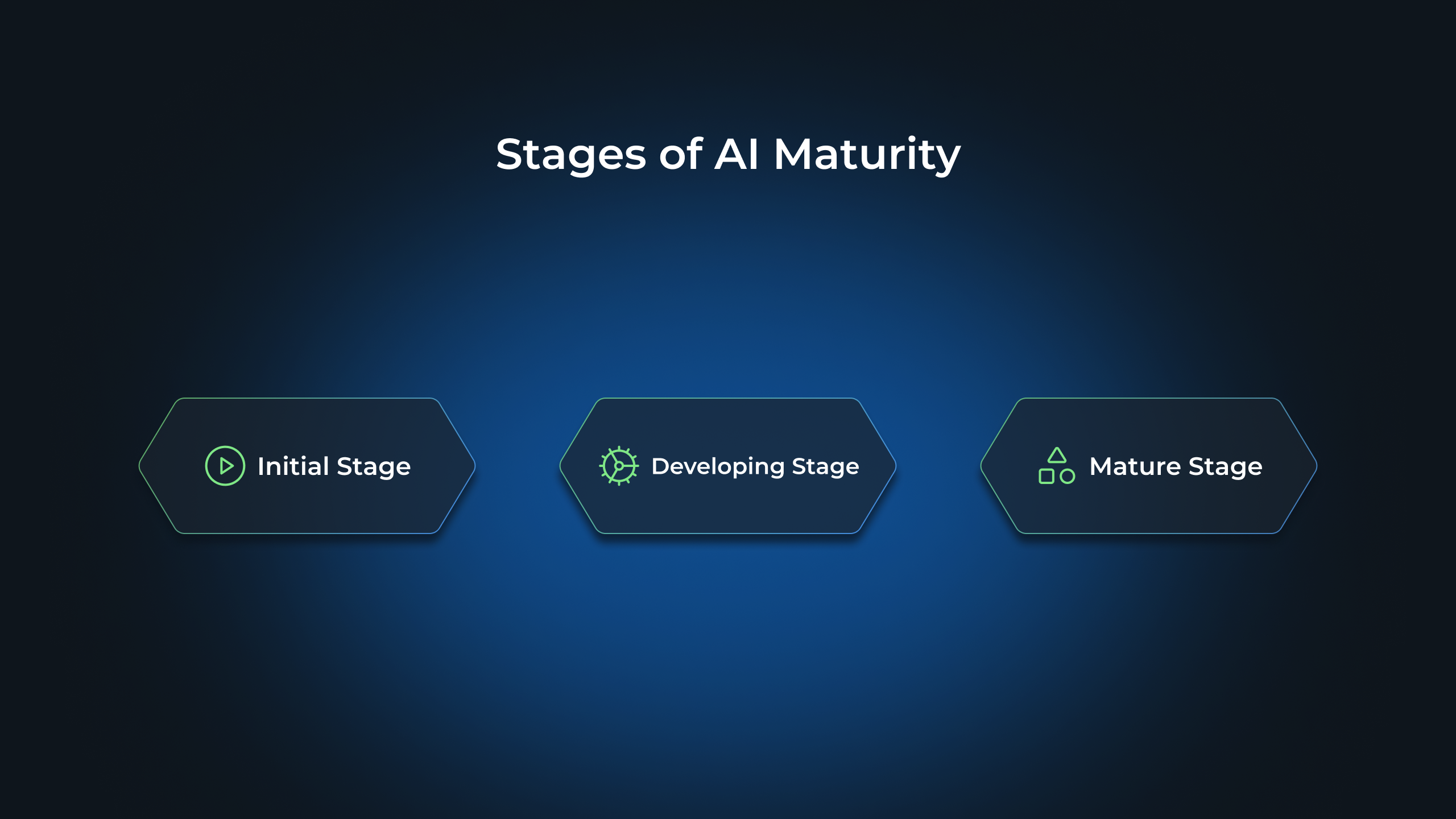In today’s rapidly advancing technological landscape, artificial intelligence (AI) has emerged as a powerful tool for businesses across industries. AI has the potential to transform operations, drive innovation, and unlock new opportunities. However, it’s essential for companies to understand their AI maturity level before embarking on this journey. Assessing your company’s AI maturity provides valuable insights into your current capabilities and helps you plan for the future. In this full guide, we will explore the steps involved in assessing your company’s AI maturity level and how it can benefit your business.
What is the AI Maturity?
Before diving into the assessment process, let’s take a moment to understand what AI maturity truly means. AI maturity refers to a company’s readiness to embrace and leverage AI technologies. It encompasses various aspects, including the organization’s understanding of AI, its current AI usage, the availability of data infrastructure, talent and expertise, and the overall AI strategy and leadership. Assessing AI maturity is crucial because it allows you to identify gaps and areas for improvement, enabling you to make informed decisions.
When it comes to AI maturity, it’s important to recognize that it is not a one-size-fits-all concept. Different organizations may have varying levels of AI maturity based on their industry, size, resources, and goals. Some companies may be at the forefront of AI adoption, while others may still be in the early stages of exploring AI technologies.
Defining AI Maturity
AI maturity can be defined as the level of AI adoption and integration within an organization. It signifies the extent to which AI technologies and practices are embedded in the company’s operations, decision-making processes, and overall strategy. A mature AI organization is one that effectively utilizes AI to drive business value, innovation, and competitive advantage. On the other hand, an organization in the early stages of AI maturity may be exploring AI technologies but lacks widespread integration or strategic alignment.
There are several key factors that contribute to AI maturity:
- Understanding of AI: An organization’s level of AI maturity starts with its understanding of AI concepts, capabilities, and potential applications. This includes knowledge of machine learning, deep learning, natural language processing, computer vision, and other AI techniques.
- Current AI Usage: The extent to which an organization is currently using AI technologies also plays a role in its AI maturity. This can range from basic AI applications, such as chatbots or recommendation systems, to more advanced implementations, such as predictive analytics or autonomous systems.
- Data Infrastructure: AI relies heavily on data, so having a robust data infrastructure is essential for AI maturity. This includes data collection, storage, processing, and governance capabilities. Organizations with well-established data infrastructure are better positioned to leverage AI effectively.
- Talent and Expertise: The availability of AI talent and expertise within an organization is another critical factor. Skilled data scientists, machine learning engineers, and AI specialists are needed to develop, deploy, and maintain AI solutions. Organizations that invest in building a strong AI team demonstrate higher AI maturity.
- AI Strategy and Leadership: The presence of a well-defined AI strategy and strong leadership support is vital for AI maturity. This involves aligning AI initiatives with business goals, establishing clear objectives, and providing the necessary resources and support to drive AI adoption and integration.
Importance of AI Maturity in Business

Assessing your company’s AI maturity is crucial for multiple reasons. Firstly, it helps you understand where your company stands in terms of AI capabilities, allowing you to set realistic goals and expectations. By knowing your current AI maturity level, you can identify areas that need improvement and develop a roadmap for AI advancement.
Secondly, assessing AI maturity enables you to identify gaps and areas for improvement, whether it be in terms of data infrastructure, talent, or strategy. This allows you to prioritize investments and allocate resources effectively to address these gaps and enhance your AI capabilities.
Furthermore, evaluating AI maturity provides insights into how well your company is leveraging AI to drive innovation, efficiency, and competitive advantage. It helps you understand the impact of AI on your business processes, customer experience, and overall performance. By identifying successful AI use cases and best practices, you can replicate and scale those initiatives across the organization.
By understanding your AI maturity level, you can make informed decisions and take strategic actions that align with your overall business goals. Whether it’s investing in AI talent, improving data infrastructure, or refining your AI strategy, assessing and enhancing AI maturity is a continuous process that can lead to significant benefits and opportunities for your organization.
Preliminary Steps Before Assessing AI Maturity
Before conducting an AI maturity assessment, there are a few preliminary steps that need to be taken. These steps will help you gather the necessary information and set the foundation for a comprehensive evaluation:
Identifying Your Current AI Usage
The first step is to identify how your company currently uses AI technologies. Assess the applications and systems that leverage AI, such as chatbots, predictive analytics, or process automation. Determine the extent of AI integration within your organization to gain a clear understanding of its current usage and potential areas for improvement.
For example, you may discover that your company utilizes chatbots to handle customer inquiries and provide support. These chatbots use natural language processing algorithms to understand customer queries and provide relevant responses. Additionally, you may find that predictive analytics is used to analyze large datasets and generate insights that drive decision-making processes.
By delving into the specific AI technologies employed by your organization, you can gain insights into the various ways AI is already being utilized and its impact on different aspects of your business.
Setting Your AI Goals
Next, define your AI goals and aspirations. What do you hope to achieve with AI? Are you looking to optimize existing processes, enhance customer experience, or explore new business opportunities? Clearly outlining your AI objectives will help you align your assessment efforts and identify the areas where AI can have the greatest impact.
For instance, if your goal is to optimize existing processes, you may want to focus on assessing the efficiency and effectiveness of AI-driven automation systems. This could involve evaluating how well these systems streamline workflows, reduce errors, and increase productivity.
On the other hand, if your objective is to enhance customer experience, you may want to assess the AI technologies used in customer service interactions. This could involve evaluating the accuracy and responsiveness of chatbots, as well as their ability to understand and address customer needs effectively.
By setting clear AI goals, you can tailor your assessment to focus on the specific areas that are most relevant to your organization’s objectives. This will enable you to identify the strengths and weaknesses of your current AI capabilities and develop a roadmap for future improvements.
Key Components of AI Maturity
Assessing your company’s AI maturity involves evaluating various key components that contribute to AI readiness and effectiveness. These components include:
Data Infrastructure
An organization’s data infrastructure forms the backbone for AI initiatives. Assess the availability, quality, and accessibility of your data. From our experience, we have seen that a robust data infrastructure is essential for successful AI implementation and requires both technical capabilities and data governance practices.
When evaluating the availability of data, consider the different sources from which you can gather relevant information. This may include internal databases, external APIs, or even publicly available datasets. Assess the quality of your data by examining factors such as accuracy, completeness, and consistency. Ensure that your data is accessible to the relevant stakeholders within your organization, as this will facilitate the development and deployment of AI models.
Furthermore, it is important to consider the scalability and security of your data infrastructure. As your AI initiatives grow, you will need to ensure that your infrastructure can handle the increasing volume of data. Implementing proper security measures is crucial to protect sensitive information and maintain the trust of your customers and stakeholders.
Talent and Expertise
Having the right talent and expertise is crucial for AI maturity. Evaluate the skills and knowledge of your team members. Assess if you have the necessary AI expertise, or if there is a need to upskill or hire new talent to support your AI initiatives effectively.
When evaluating the skills of your team members, consider their proficiency in areas such as machine learning, data analysis, and programming. It is important to have a diverse team with a range of skills to ensure that all aspects of AI implementation are covered. Additionally, assess the level of domain expertise within your team. Having individuals who understand the specific challenges and nuances of your industry will greatly contribute to the success of your AI initiatives.
Upskilling your existing team members can be a cost-effective way to enhance your AI capabilities. Consider providing training programs or encouraging employees to pursue relevant certifications or courses. Alternatively, if there are significant skill gaps, it may be necessary to hire new talent with the required expertise.
AI Strategy and Leadership
An AI strategy provides a roadmap for your organization’s AI journey. Assess the clarity and alignment of your AI strategy with your overall business goals. Evaluate the leadership’s commitment to AI initiatives, including the allocation of resources, budget, and support from the top.
When evaluating your AI strategy, consider its comprehensiveness and specificity. A well-defined strategy should outline the objectives, timelines, and key milestones of your AI initiatives. It should also consider potential risks and challenges, along with mitigation strategies. Ensure that your AI strategy is aligned with your overall business goals to ensure that AI efforts are focused on driving value and achieving strategic objectives.
Leadership commitment is crucial for the success of AI initiatives. Evaluate if your organization’s leaders understand the potential of AI and are actively supporting its implementation. This includes providing the necessary resources, budget, and support to drive AI projects forward. Leadership should also foster a culture of innovation and experimentation, encouraging employees to explore AI opportunities and embrace new technologies.
In conclusion, assessing your company’s AI maturity involves evaluating key components such as data infrastructure, talent and expertise, and AI strategy and leadership. By thoroughly analyzing these components and making necessary improvements, you can enhance your organization’s AI readiness and effectiveness, paving the way for successful AI implementation and transformation.
Stages of AI Maturity

AI maturity can be categorized into three stages: initial stage, developing stage, and mature stage. Each stage represents a different level of AI adoption and integration within organizations.
Initial Stage
In the initial stage, companies have limited or no AI adoption. AI is viewed as a novelty or experiment rather than a strategic tool. Organizations at this stage are typically focused on exploring AI technologies and their potential benefits.
During this stage, companies may be conducting pilot projects or small-scale experiments to understand the capabilities and limitations of AI. They may be testing AI algorithms or machine learning models to gain insights into customer behavior, optimize processes, or improve decision-making.
However, the use of AI in the initial stage is often sporadic and lacks a comprehensive strategy. Companies may be hesitant to fully embrace AI due to concerns about cost, implementation challenges, or the impact on existing workflows.
Developing Stage
In the developing stage, companies have started to integrate AI technologies into their operations. AI is no longer seen as a separate initiative but rather as an integral part of the organization’s core functions. Organizations at this stage are actively investing in AI and are committed to driving AI-driven transformation.
During this stage, companies are scaling up their AI initiatives and expanding their AI capabilities. They may be implementing AI-powered solutions in various areas such as customer service, supply chain management, predictive analytics, or fraud detection.
Companies in the developing stage are also focused on building AI talent and expertise. They may be hiring data scientists, AI engineers, or machine learning specialists to drive AI innovation and ensure the successful implementation of AI projects.
Furthermore, organizations at this stage are actively collaborating with AI vendors, research institutions, or industry partners to stay updated with the latest AI advancements and best practices.
Mature Stage
In the mature stage, AI technologies are fully integrated, and the organization has a well-defined AI strategy. AI is deeply ingrained in the company culture, operations, and decision-making processes. Organizations at this stage are reaping the rewards of their AI investments, driving innovation, and enjoying a competitive edge.
At this stage, companies have successfully overcome the initial challenges associated with AI adoption and have established a strong foundation for AI-driven transformation. They have developed robust AI infrastructure, including data pipelines, AI platforms, and scalable computing resources.
Organizations in the mature stage are leveraging AI to automate routine tasks, optimize business processes, and generate actionable insights from large volumes of data. They may be using AI-powered chatbots for customer support, implementing machine learning algorithms for demand forecasting, or utilizing natural language processing for sentiment analysis.
Moreover, companies in the mature stage are continuously refining their AI models and algorithms to improve accuracy, efficiency, and performance. They are investing in ongoing AI research and development to stay ahead of the competition and explore new AI applications.
Overall, the mature stage represents a state of AI excellence, where organizations have fully embraced AI as a strategic tool and are leveraging its power to drive innovation, enhance customer experiences, and achieve business success.
Assessment Tools for AI Maturity
There are various tools available to assess your company’s AI maturity level:
AI Maturity Self-Assessment
A self-assessment allows you to evaluate your company’s AI maturity independently. It typically involves a set of predefined questions or criteria that help you gauge your organization’s readiness and capabilities. Completing a self-assessment can provide valuable insights but may lack the external perspective that an expert assessment can offer.
External AI Maturity Assessment
Engaging an external AI maturity assessment provides a more comprehensive and objective evaluation of your company’s AI maturity. External assessments leverage the expertise of professionals who thoroughly evaluate your processes, infrastructure, talent, and strategy. External assessments offer greater depth and are tailored to your specific industry and business needs.
AI Maturity Assessment Interpretation
Once you have conducted the assessment, it’s crucial to interpret the results effectively:
Understanding Your AI Maturity Score
An AI maturity score provides a snapshot of your current AI capabilities and readiness. It highlights your strengths, areas for improvement, and potential gaps. Understanding your AI maturity score helps you prioritize your actions and allocate resources effectively.
Developing an Action Plan Based on Your Assessment
Based on the assessment results, you can develop a clear action plan to enhance your AI maturity. Identify specific areas that require attention, set realistic goals, and define the necessary steps to achieve them. Allocate resources strategically and implement changes gradually for long-term success.
AI Maturity Enhancement
Assessing your company’s AI maturity is just the beginning. To enhance your AI maturity level, consider the following actions:
AI Talent and Trainings
Talent plays a critical role in AI success. Identify skill gaps within your organization and invest in training programs or hire specialized talent. Upskilling your existing workforce and fostering a culture of continuous learning will ensure that you have the right people to drive your AI initiatives.
Data Infrastructure
Data is the lifeblood of AI. Enhance your data infrastructure by implementing robust data governance practices, ensuring data quality and security, and establishing data pipelines that enable seamless data flow. A strong data foundation will enable you to derive meaningful insights and make informed decisions.
AI Strategy
Regularly review and refine your AI strategy to stay aligned with your business goals. Continuously assess emerging AI technologies, trends, and best practices to ensure that your strategy remains relevant and effective. Fostering strong AI leadership and ensuring cross-functional collaboration are also crucial for successful implementation.
As a software development company with a proven track record in building innovative AI solutions, WeSoftYou understands the importance of assessing AI maturity for businesses. Whether you are just starting your AI journey or looking to enhance your existing capabilities, we can provide you with expert guidance and support. Contact us for a free consultation or project estimation and discover how we can help you unlock the full potential of AI for your business.
Conclusion
In the rapidly evolving landscape of today’s technology-driven business environment, this comprehensive guide has unraveled the intricate layers of AI maturity, presenting it not as a singular destination but a dynamic journey tailored to each organization’s distinct needs. Understanding where your company stands in the spectrum of AI maturity is the crucial first step in leveraging AI’s transformative power. Whether your organization is at the initial stage, cautiously exploring AI’s potential, or has reached the mature stage, where AI is seamlessly integrated into the fabric of your operations, this guide equips you with the insights needed for informed decision-making.
The roadmap to AI maturity extends beyond assessment, evolving into a strategic action plan. Armed with a nuanced understanding of strengths, areas for improvement, and potential gaps, organizations can craft bespoke strategies for AI enhancement. This involves continuous efforts in fortifying AI talent, solidifying data infrastructure, and refining AI strategy to remain agile in the face of ever-evolving technologies. As a trusted partner in AI solutions, WeSoftYou stands ready to guide organizations through every stage of the AI maturity journey, ensuring businesses unlock the full potential of AI for transformative growth. Contact us for a free consultation, and let’s embark on a collaborative journey towards AI excellence.
FAQ
AI maturity level refers to the extent of an organization’s proficiency and capability in effectively implementing and leveraging artificial intelligence (AI) technologies. It gauges how well a company can integrate AI into its processes, make informed decisions based on AI insights, and continually evolve its use of AI technologies. A higher AI maturity level indicates a more advanced and adept use of AI within an organization, often resulting in improved efficiency, innovation, and strategic decision-making.
The duration of the AI maturity assessment process can vary depending on the complexity and scale of your organization. Typically, it can range from a few weeks to a few months. The assessment process involves data gathering, interviews, analysis, and the development of actionable recommendations tailored to your specific needs.
Failing to assess your company’s AI maturity can result in several risks. Without a clear understanding of your current capabilities and gaps, you may miss out on opportunities to leverage AI effectively. You may invest resources in areas that are not aligned with your business goals or struggle to keep up with competitors who have already embraced AI. Assessing AI maturity allows you to make informed decisions and take proactive steps to stay ahead in today’s AI-driven business landscape.
Absolutely! An external AI maturity assessment brings an unbiased perspective and expertise to the evaluation process. It helps you identify blind spots, uncover hidden opportunities, and gain insights from experienced professionals who have worked with diverse organizations. An external assessment can provide valuable recommendations and best practices to accelerate your AI maturity journey.
As a software development company with a proven track record in building innovative AI solutions, WeSoftYou understands the importance of assessing AI maturity for businesses. Whether you are just starting your AI journey or looking to enhance your existing capabilities, we can provide you with expert guidance and support. Contact us for a free consultation or project estimation and discover how we can help you unlock the full potential of AI for your business.





















